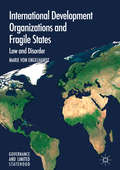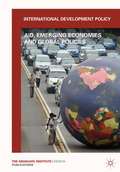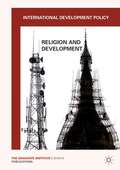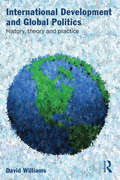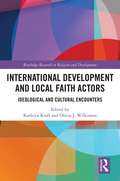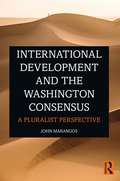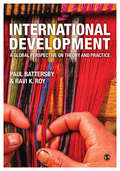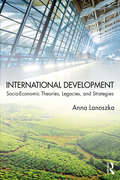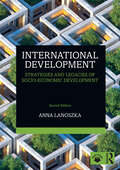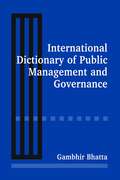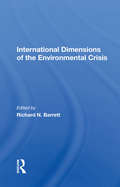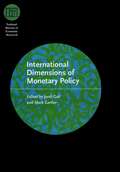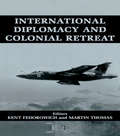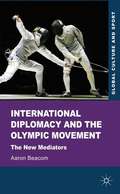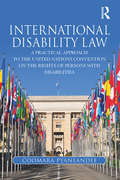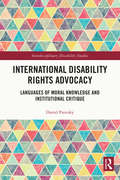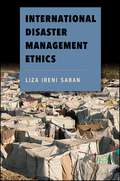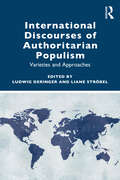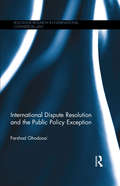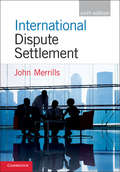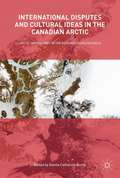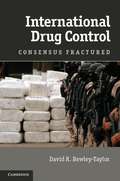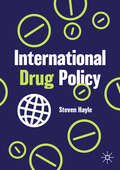- Table View
- List View
International Development Organizations and Fragile States
by Marie Von EngelhardtThis book addresses a conundrum for the international development community: The law of development cooperation poses major constraints on delivering aid where it is needed most. The existence of a state with an effective government is a basic condition for the transfer of aid, making development cooperation with 'fragile' nations particularly challenging. The author explores how international organizations like the World Bank have responded by adopting formal and informal rules to engage specifically with countries with weak or no governments. Von Engelhardt provides a critical analysis of the discourse on fragile states and how it has shaped the policy decision-making of international organizations. By demonstrating how perceptions of fragility can have significant consequences both in practice and in law, the work challenges conventional research that dismisses state fragility as a phenomenon beyond law. It also argues that the legal parameters for effective global policy play a crucial role, and offers a fresh approach to a topic that is central to international security and development.
International Development Policy: Aid, Emerging Economies and Global Policies
by Gilles CarbonnierInternational development cooperation is undergoing a revolution. The authors question how far bilateral and multilateral aid agencies succeed in mainstreaming global issues in their operations and assess how emerging and traditional donors address competing objectives, often with diverging rationales. Cases include Brazil, China and South Africa.
International Development Policy: Religion and Development
by Et. Al. Gilles CarbonnierWith the resurgence of religion and rise of fundamentalism within major religions, academics and development agencies are increasingly debating the appropriate role of religion and faith-based organisations in development policy and practice. A global cast of scholars and practitioners examine these issues and fundamentally question the secular-religious dichotomy in development discourse and practice. They shed light on the reluctance of mainstream economic development approaches to incorporate religion into policy and practice. They examine recent initiatives by international development agencies and donors to integrate religion into development policy, and to develop partnerships with faith-based organizations. Through research on religious movements in Brazil, South Africa, Sri Lanka, China, Turkey and the states of the 'Arab-Spring', the authors discuss whether faith and religion provide a credible alternative to the (neo)liberal democratic development agenda.
International Development and Global Politics: History, Theory and Practice
by David WilliamsThis textbook provides a historical survey of economic and political development theory and practice from 1945. Against the background of changes in global politics, it explores how the project of international development has been shaped in a series of wider contexts. Divided into two historical parts: the Sovereign Order, post 1945 to the early-1980s, and the Liberal post-Cold War Era from the 1980s to the present day, it examines: the evolution of ideas of international development: how the problem of development was conceived and is understood in relation to development economics and political development. It also addresses the impact of neo-liberal ‘counterrevolution’ in development theory, the rise of good governance, participation and ownership, as well as the impact of the ‘war on terror’ and the ‘securitisation of development’ institutions in international development: from the emergence of development agencies, their policies and the provision of different types of aid to changing aid flows and the growth of a more integrated ‘development community’ with implications for developing countries. Finally, it looks at the how the ‘war on terror’ and the ‘securitisation of development’ have shaped what these agencies do the practices of international development: these chapters examine a number of countries and their relations with development agencies; the kinds of projects and programmes these agencies supported; and the outcomes of these projects and programmes. This valuable and important teaching tool will be of interest to students of development, international relations, politics and economics.
International Development and Local Faith Actors: Ideological and Cultural Encounters (Routledge Research in Religion and Development)
by Olivia J. Wilkinson Kathryn KraftThis book explores the interplay and dialogue between faith communities and the humanitarian-development community. Faith and religion are key influencers of thought and practice in many communities around the world and development practitioners would not be able to change behaviours for improved health and social relations without the understanding and influence of those with authority in communities, such as religious leaders. Equally, religious leaders feel responsibilities to their communities, but do not necessarily have the technical knowledge and resources at hand to provide the information or services needed to promote the well-being of all in their scope of influence. The book demonstrates that partnerships between humanitarian-development practitioners and religious communities can be mutually beneficial exchanges, but that there are also frequently pitfalls along the way and opportunities for lessons to be learned by each party. Delving into how humanitarians and faith communities engage with one another, the book focuses on building knowledge about how they interact as peers with different yet complementary roles in community development. The authors draw on the Channels of Hope methodology, a tool which seeks to engage faith leaders in addressing social norms and enact social change, as well as other related research in the sector to demonstrate the many ways in which humanitarian and development policy makers and practitioners could achieve more systematic engagement with faith groups. This book is an important contribution to the growing body of literature on faith and development, and will be useful both to researchers, and to practitioners working with faith communities.
International Development and the Washington Consensus: A Pluralist Perspective
by John MarangosIn this book, John Marangos offers an insightful analytical and theoretical review of the Washington Consensus and its successors among the mainstream. Following an intuitive structure, it explores international development and the Washington Consensus, as a critique through the lenses of Neoclassical economics, Post Keynesian economics, Institutional economics, and Marxist economics. Ultimately, it provides a compelling alternative perspective to the dominant development paradigm, and enables readers to identify the interconnections, interrelationships, and intercontradictions between different frameworks and policies. It will be a valuable supplementary reading for students, researchers, and policymakers in international development, development economics, heterodox economics, and the history of economic thought.
International Development: A Global Perspective on Theory and Practice
by Paul Battersby Ravi K RoyHow can we lay the foundation for a more just and peaceful world? How can we prevent communications from fracturing and societies from tearing themselves apart? How should we prioritise economic, social and cultural demands for resources and opportunities? This book answers these questions, and presents a view of development ‘in practice’. Written by experts in the field, the book covers a range of contemporary developments, as well as providing coverage of the theory and practice of international development. The book: · Covers a range of contemporary topics such as global security, new technologies, ethics and learning and participation · Has chapters on Global Health and Development in Practice, Environmentally Sustainable Development in Practice and Corruption and Development · Features learning objectives, summaries, reading lists and questions for discussion · Works as a practice-driven text packed with case studies Global in perspective and full of everything you need to know, this is your go-to book for your studies in International Development.
International Development: A Global Perspective on Theory and Practice
by Paul Battersby Ravi K RoyHow can we lay the foundation for a more just and peaceful world? How can we prevent communications from fracturing and societies from tearing themselves apart? How should we prioritise economic, social and cultural demands for resources and opportunities? This book answers these questions, and presents a view of development ‘in practice’. Written by experts in the field, the book covers a range of contemporary developments, as well as providing coverage of the theory and practice of international development. The book: · Covers a range of contemporary topics such as global security, new technologies, ethics and learning and participation · Has chapters on Global Health and Development in Practice, Environmentally Sustainable Development in Practice and Corruption and Development · Features learning objectives, summaries, reading lists and questions for discussion · Works as a practice-driven text packed with case studies Global in perspective and full of everything you need to know, this is your go-to book for your studies in International Development.
International Development: Socio-Economic Theories, Legacies, and Strategies
by Anna LanoszkaInternational Development is a comprehensive inquiry into the field of socio-economic development founded on an understanding that economic advancement involves transformation of society. It explores successful developmental strategies but also tries to identify factors behind failed endeavours and the human costs associated with them. The book evaluates the role played by influential agents of development, such as the state and its institutions, authoritarian leaders, international organizations, donor agencies, non-governmental organizations, civil society activists, and private business actors. Key features: A multi-disciplinary approach taking into account politics, economics, sociology, cultural aspects, and history of development; Examines a breadth of different theoretical approaches and their practical applications; Presents both mainstream and critical viewpoints; Addresses such complex issues as governability processes, rights of the poor, colonial legacy, armed conflict, environmental sustainability, gender relations, foreign aid, urbanization, rural development, and international trade; Suggested further reading list at the end of each chapter. This well-balanced book will be a key text for students and practitioners working in the area of socio-economic development and more broadly in development studies, the politics of development and international political economy.
International Development: Strategies and Legacies of Socio-Economic Development
by Anna LanoszkaInternational Development: Strategies and Legacies of Socio-Economic Development examines the multifaceted challenges and strategies underlying socio-economic progress in a globally interconnected world.Grounded in a thorough historical and theoretical framework, this book explores the evolution of developmental strategies, from post-colonial challenges, the growing influence of international organizations, and the role of state policies to the impacts of global market integration and demands for environmental sustainability. It scrutinizes the effectiveness of international organizations and foreign aid agencies, the resilience of local strategies, and the persistent disparities shaped by historical legacies, extractive and inclusive state institutions, deficit of individual rights, systemic poverty, gender inequality, armed conflicts, environmental hazards, and food insecurity. Through case studies and document-driven insights, it highlights the intersection of institutional frameworks, economic imperatives, and human agency in shaping developmental outcomes. By integrating environmental and sustainability considerations with economic strategies, the book underscores the necessity of inclusive policies that address structural barriers and promote human-centered development. This new edition has been thoroughly updated to include material on decolonization, the various effects of the Covid-19 pandemic, gender and sexual orientation-based discrimination, climate change, migration, and economic insecurity.With a multi-disciplinary approach taking into account politics, international relations, economics, sociology, cultural studies, and the history of development, this book is an invaluable resource for students and scholars, as well as policy makers and practitioners working and researching in those fields.
International Dictionary of Public Management and Governance
by Gambhir BhattaThis authoritative, up-to-date resource will become the standard reference on the theory and practice of public management around the world. Public management addresses strategy, policy processes, and governance as well as the bureaucratic concerns of public administration. Reflecting this diversity, the Dictionary incorporates concepts from various other fields including economics, political science, management, sociology, and psychology. The reference draws from an extensive literature base including books, journals, websites, research reports, government proceedings, legal documents, and international and organizational reports. As the primary source of ready information for students, researchers, scholars, and practitioners, it defines all the fundamental concepts of public management, their applications, and all relevant theories, complete with sources and references.
International Differences in Entrepreneurship
by Josh Lerner Antoinette SchoarOften considered one of the major forces behind economic growth and development, the entrepreneurial firm can accelerate the speed of innovation and dissemination of new technologies, thus increasing a country's competitive edge in the global market. As a result, cultivating a strong culture of entrepreneurial thinking has become a primary goal throughout the world. Surprisingly, there has been little systematic research or comparative analysis to show how the growth of entrepreneurship differs among countries in various stages of development. International Differences in Entrepreneurship fills this void by explaining how a country's institutional differences, cultural considerations, and personal characteristics can affect the role that entrepreneurs play in its economy. Developing an understanding of the origins of entrepreneurs as well as the choices they make and the complexity of their activities across countries and industries are of central importance to this volume. In addition, contributors consider how environmental factors of individual economies, such as market regulation, government subsidies for banks, and support for entrepreneurial culture affect the industry and the impact that entrepreneurs have on growth in developing nations.
International Dimensions Of The Environmental Crisis
by Richard N BarrettThis volume is a collection of seventeen essays, offering in-depth and comparative studies of areas faced with environmental crisis. Arranged in five sections that include practical and philosophical problems; Latin America; Europe; Asia and Africa. With focus on the problems faced in the Sahara Desert, the Amazon, the Punjab and a comparative study of Ethiopia and Nigeria; highlighting the seriousness of certain environmental trends and the action of governments.
International Dimensions of Monetary Policy
by Mark Gertler Jordi GalíUnited States monetary policy has traditionally been modeled under the assumption that the domestic economy is immune to international factors and exogenous shocks. Such an assumption is increasingly unrealistic in the age of integrated capital markets, tightened links between national economies, and reduced trading costs. International Dimensions of Monetary Policy brings together fresh research to address the repercussions of the continuing evolution toward globalization for the conduct of monetary policy. In this comprehensive book, the authors examine the real and potential effects of increased openness and exposure to international economic dynamics from a variety of perspectives. Their findings reveal that central banks continue to influence decisively domestic economic outcomes--even inflation--suggesting that international factors may have a limited role in national performance. International Dimensions of Monetary Policy will lead the way in analyzing monetary policy measures in complex economies.
International Diplomacy and Colonial Retreat
by Martin Thomas Kent FedorowichThe problems investigated in this collection had lasting consequences not only in the field of colonialism but in international politics as well. Decolonization and the Cold War, which brought about the most significant changes to global policits after 1945, are treated together.
International Diplomacy and the Olympic Movement
by Aaron BeacomThis book explores the relationship between diplomatic discourse and the Olympic Movement, charting its continuity and change from an historical perspective. Using the recent body of literature on diplomacy it explores the evolution of diplomatic discourse around a number of themes, in particular the increasing range of stakeholders engaged in the Olympic bid, disability advocacy and the mainstreaming of the Paralympic Games and the evolution of the Olympic boycott. The work addresses the increasing engagement of a number of non-state actors, in particular the IOC and the IPC, as indicative of the diffusion of contemporary diplomacy. At the same time it identifies the state as continuing in the role of primary actor, setting the terms of reference for diplomatic activity beyond the pursuit of its own policy interests. Its historical investigation, based around a UK case study, provides insights into the characteristics of diplomatic discourse relating to the Games, and creates the basis for mapping the future trajectory of diplomacy as it relates to the Olympic Movement.
International Disability Law: A Practical Approach to the United Nations Convention on the Rights of Persons with Disabilities
by Coomara PyaneandeeThis book provides a concise guide to international disability law. It analyses the case law of the CRPD Committee and other international human rights treaty bodies, and provides commentaries on more than 50 leading cases. The author elaborates on the obligations of States Parties under the CRPD and other international treaties, while also spelling out the rights of persons with disabilities, and the different mechanisms that exist at both domestic and international levels for ensuring that those rights are respected, protected and promoted. The author also delineates the traditional differentiation between civil and political rights on the one hand, and economic, social and cultural rights on the other. He demonstrates, through analysis of the evolving case law, how the gap between these two sets of rights is gradually closing. The result is a powerful tool for political decisionmakers, academics, legal practitioners, law students, persons with disabilities and their representative organisations, human rights activists and general readers.
International Disability Rights Advocacy: Languages of Moral Knowledge and Institutional Critique (Interdisciplinary Disability Studies)
by Daniel PateiskyThis book provides insight into the globally interlinked disability rights community and its political efforts today. By analysing what disability rights activism contributes to a global power apparatus of disability-related knowledge, it demonstrates how disability advocacy influences the way we categorise, classify, distribute, manipulate, and therefore transform knowledge. By unpacking the mutually constitutive relations between (practical) moral knowledge of international disability advocates and (formal) disability rights norms that are codified in international treaties such as the UN Convention on the Rights of Persons with Disabilities (CRPD), the author shows that the disability rights movement is largely critical of statements that attempt to streamline it. At the same time, cross-cultural disability rights advocacy requires images of uniformity to stabilise its global legitimacy among international stakeholders and retain a common meta-code that visibly identifies its means and aims. As an epistemic community, disability rights advocates simultaneously rely on and contest the authority of international human rights infrastructure and its language. Proving that disability rights advocates contribute immensely to a global culture that standardises what is considered morally and legally ‘right’ and ‘wrong’, thereby shaping the human body and the body politic, this book will be of interest to all scholars and students of disability studies, sociology of knowledge, legal and linguistic anthropology, social inequality, and social movements.
International Disaster Management Ethics
by Liza Ireni SabanToday's international disaster management community faces demanding political and ethical challenges. In International Disaster Management Ethics, Liza Ireni Saban suggests that it is crucial for international aid organizations engaged in disaster management to attempt to lift the moral fog that envelops their practice and to alert them to the ethical implications and meaning of their decisions and actions, commitment to exercising ethical judgment, and leadership. Drawing on examples from large scale natural disasters—the 2003 Bam earthquake in Iran, the 2004 Indian Ocean earthquake and tsunami, the 2005 hurricanes that struck the US Gulf Coast, the 2010 Haitian earthquake, and the 2013 Philippines typhoon—Saban applies current prominent perspectives on global justice to international disaster management, arguing that a process of codification will enhance the capacity to professionalize distributive decision making. Rather than being obligatory, taking into account global distributive considerations will become a defining part of the profession at a global level, at a time when international disaster relief is facing more and more severe natural disasters.
International Discourses of Authoritarian Populism: Varieties and Approaches
by Ludwig Deringer and Liane StröbelInternational Discourses of Authoritarian Populism provides 15 cutting-edge chapters probing into the diversity of present-day populist discourse from across the world. Not adhering to any particular school, the volume explores populism from a variety of disciplines and perspectives, with contributions characterized by heuristic openness as called for by the manifold manifestations of populism. The chapters balance theoretical and empirical studies, as well as quantitative and qualitative surveys and case studies, to offer readings on historical and new types of populism, and the politicians associated with these variates. Authors draw on a variety of print, digital, textual, and visual source materials to provide a close examination of the phenomena interconnected with populism including separatism (Catalexit), human rights and legal issues, debate rhetoric, and journalism, with many authors writing as insiders about the situation within their own country. Through its multi-disciplinarity, International Discourses of Authoritarian Populism provides fresh insights into the existing and potential dangers of populism, and a basis for further critical assessment and discussion. It will be a key resource for scholars and students across a range of disciplines, including sociology, political science, linguistics, media and communication studies, literary studies, and history. Moreover, it will be of special interest to professionals who deal with both national and international issues of populism.
International Dispute Resolution and the Public Policy Exception (Routledge Research in International Commercial Law)
by Farshad GhodoosiDespite the unprecedented growth of arbitration and other means of ADR in treaties and transnational contracts in recent years, there remains no clearly defined mechanism for control of the system. One of the oldest yet largely marginalized concepts in law is the public policy exception. This doctrine grants discretion to courts to set aside private legal arrangements, including arbitration, which might be considered harmful to the "public". The exceptional and vague nature of the doctrine, along with the strong push of actors in dispute resolution, has transformed it, in certain jurisdictions, to a toothless doctrine. At the international level, the notion of transnational public policy has been devised in order to capture norms that are "truly" transnational and amenable for application in cross-border litigations. Yet, despite the importance of this discussion—a safety valve and a control mechanism for today’s international and domestic international dispute resolution— no major study has ventured to review and analyze it. This book provides a historical, theoretical and practical background on public policy in dispute resolution with a focus on cross-border and transnational disputes. Farshad Ghodoosi argues that courts should adopt a more systemic approach to public policy while rejecting notions such as transnational public policy, which limits the application of those norms with mandatory nature. Contrary to the current trend, the book invites the reader to re-conceptualize the role of public policy, and transnational dispute resolution, in order to have more sustainable, fair and efficient mechanisms for resolving disputes outside of national courts. The book sheds light on one of the most important yet often-neglected control mechanisms of today’s international dispute resolution and will be of particular interest to students and academics in the fields of International Investment Law, International Trade Law, Business and Economics.
International Dispute Settlement
by Merrills J. G.A completely updated edition of a definitive survey of the peaceful settlement of disputes - a key aspect of international law and international relations. Many methods of handling such disputes have been developed, and this book explains what the relevant techniques and institutions are, how they work and when they are used. Separate chapters cover the various diplomatic methods (negotiation, mediation, inquiry and conciliation), the legal methods (arbitration and judicial settlement), the special arrangements for disputes concerning trade or the law of the sea, and the role of the United Nations and regional organisations. The strengths and limitations of each method are illustrated with numerous examples taken from international practice. This new edition deals with many current developments, including the latest UN peace-keeping operations, the work of the WTO and of the International Tribunal for the Law of the Sea, and the latest case-law of the International Court of Justice.
International Disputes and Cultural Ideas in the Canadian Arctic: Arctic Sovereignty in the National Consciousness
by Danita Catherine BurkeThis book explores the Canadian relationship with its portion of the Arctic region which revolves around the dramatic split between the appearance of absent-minded governance, bordering on indifference toward the region, and the raging nationalism during moments of actual and perceived challenge toward the sovereignty of the imagined "Canadian Arctic region. " Canada's nationalistic relationship with the Arctic region is often discussed as a reactionary phenomenon to the Americanization of Canada and the product of government propaganda. As this book illustrates, however, the complexity and evolution of the Canadian relationship with the Arctic region and its implication for Canada's approach toward international relations requires a more in-depth exploration
International Drug Control
by David R. Bewley-TaylorThere remains substantial agreement among the international community on many aspects of the contemporary UN drug control regime. However, diverging views on the non-medical and non-scientific use of a range of controlled substances make drug policy an increasingly contested and transitionary field of multinational cooperation. Employing a fine-grained and interdisciplinary approach, this book provides the first integrated analysis of the sources, manifestations and sometimes paradoxical implications of this divergence. The author develops an original explanatory framework through which to understand better the dynamic and tense intersection between policy shifts at varying levels of governance and the regime's core prohibitive norm. Highlighting the centrality of the harm reduction approach and tolerant cannabis policies to an ongoing process of regime transformation, this book examines the efforts of those actors seeking to defend the existing international control framework and explores rationales and scenarios which may lead to the international community moving beyond it.
International Drug Policy
by Steven HayleThis textbook provides an overview of international drug policy using a comparative framework to explore contemporary drug issues. Using a topical approach, each chapter examines a different topic pertaining to drug policy to illustrate the range of contrasting approaches adopted including: decriminalisation, prohibition, legalisation, and harm reduction. In this way, it speaks to students in the field of criminology and justice and beyond with a focus on criminal laws and the administration of criminal justice. It draws on global examples from over 30 countries throughout to discuss and compare drug policies. The book includes a host of pedagogic features including case studies, exercises, study questions, web resources and chapter summaries. It starts by providing an overview of the psychoactive and pharmacological effects of illicit drugs, discusses how to compare policies across many countries, and provides a history of the global drug prohibition regime and how it is evolving internationally. Many of the chapter topics that follow relate to “drug control regimes” which are different forms of regulatory strategies found operating in many countries around the world. It also discusses the global movement toward the decriminalization of all drugs. It incorporates multidisciplinary, theoretical and methodological approaches drawing on the work of a wide range of scholars including historians, political scientists, sociologists, psychologists, economists, and lawyers.
